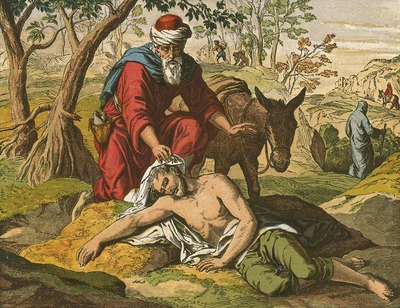Fifteenth Sunday in Ordinary Time
July 13, 2025 — Year C
Readings: Dt 30:10-14 / Ps 69 / Col 1:15-20 / Lk 10:25-37
by Rev. Nixon Negparanon, Pastor
Today’s readings invite us into a deeper understanding of what it means to live the faith we profess, not only through words or pious intentions, but through concrete acts of love and mercy. The scriptures challenge us to look inward and outward, to see the law not as distant and unattainable, but as something already written on our hearts, calling us to reach out to others, especially those most in need.
Moses, in our first reading, tells the people of Israel that God’s commandments are not too mysterious or remote. The law is not in heaven nor is it beyond the sea. No, it is something very near to you, already in your mouths and in your hearts. You have only to carry it out. This is a profound affirmation: God’s will is accessible. We do not need to search far and wide to discover how we are to live. The law of love has already been revealed to us. It is within us, inviting us to respond. This anticipates the new covenant in Christ, who fulfills the law and calls us to love God and neighbor with our whole being.
In our second reading, St. Paul proclaims the cosmic and divine majesty of Christ. He is the image of the invisible God. All things were created through Him and for Him; and through Him, God was pleased to reconcile all things to Himself.
Why does Paul emphasize Christ’s supremacy here? Because only in Christ can we truly understand the meaning of love, mercy, and reconciliation. Jesus is not just a teacher of morality. He is the source and goal of all creation. He reconciles what is broken, unites what is scattered, and restores peace. This reading sets the foundation for the gospel message: The One who calls us to love our neighbor is not a distant deity, but the Lord of the universe, who Himself became our neighbor in Christ.
Our gospel reading tells us the famous parable. A scholar of the law asks Jesus a profound question: What must I do to inherit eternal life? Jesus answers with the twofold commandment: Love God and love your neighbor. But the scholar, seeking to justify himself, asks: Who is my neighbor? Jesus responds with the story that turns expectations upside down.
It is not the priest or the Levite who shows mercy, but the Samaritan, a social and religious outsider. This story forces us to confront uncomfortable truths. Love of neighbor is not limited to those like us or those we deem worthy. St. Augustine wrote, “What does love look like? It has the hands to help others, the feet to hasten to the poor and needy. That is what love looks like.” The Samaritan didn’t ask whether the man deserved help. He simply responded to suffering with compassion. Jesus’ final instruction is clear: “Go and do likewise.”
All three readings point toward one essential truth. Love is not distant, abstract, or theoretical. It is near. It is visible in the person of Christ. And it is demanded of us in daily life. Our first reading says the law is near to our hearts. St. Paul reminds us that Christ is the fullness of God’s love. And the gospel shows us what love looks like when it is lived. It crosses boundaries, takes risk, and restores life.
The Catechism of the Catholic Church reminds us that the works of mercy are charitable actions by which we come to the aid of our neighbor in his spiritual and bodily necessities. (CCC 2447) The Good Samaritan embodies the corporal and spiritual works of mercy. The Church teaches that love of neighbor is inseparable from love of God. In fact, it is the measure of our love for God. As Pope Benedict XVI once said, “A Eucharist which does not pass over into the concrete practice of love is intrinsically fragmented.”
Nowadays, where polarization, prejudice, and indifference often dominate headlines, the parable of the Good Samaritan is as urgent as ever. Who are the wounded along our roads today? We see homeless people ignored by society; the refugees fleeing war and persecution; the neighbor struggling with addiction or mental illness; the unborn child, the elderly, the lonely, and the abandoned. Even those who we might consider enemies or outsiders.
We are not called to ask, “Who is my neighbor?” as a way to limit our responsibility. Instead, we must ask, “To whom can I be a neighbor today?” Our mission as Christians is to make visible the mercy of God through our actions. We are called to be attentive to those who suffer physically, emotionally, or spiritually. To be courageous in crossing boundaries of race, religion, politics, or prejudice to serve others. To be generous with our time, compassion, and resources. And to be imitators of Christ, Who is the ultimate Good Samaritan. He stooped down to heal our wounds and gave His life to restore us.
Brothers and sisters, the commandment is not far away. Christ is not distant. The path to eternal life is not hidden. The law is in your heart. Christ in in your midst. And your neighbor is at your doorstep. Let us then go and do likewise, loving with hands that serve, with eyes that see suffering, and with hearts that beat with the mercy of Christ.
May Jesus Christ be praised.
 540-586-8988
540-586-8988 

